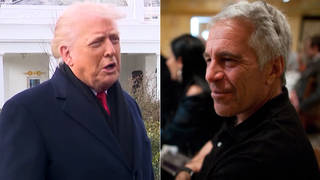
Guests
- Robert Reichformer labor secretary in the Clinton administration, academic and best-selling author.
We speak to former Labor Secretary Robert Reich about how President Trump’s firing of the head of the Bureau of Labor Statistics, hours after the agency released a weaker-than-expected jobs report, undermines a key agency. Trump claimed, without offering any evidence, that the numbers were “rigged” in order to make him look bad. The BLS report showed just 73,000 jobs were added in July and that far fewer jobs had been created in May and June than previously estimated. Trump’s dismissal of Erika McEntarfer is another sign of growing authoritarianism in the United States, says Reich, who served as labor secretary in the Clinton administration. “This is another example of Trump basically riding roughshod over our democratic institutions and truth,” says Reich.
Transcript
AMY GOODMAN: “In my opinion today’s Jobs Numbers were RIGGED in order to make the Republicans, and ME, look bad.” Those were the words of President Trump Friday as he fired the head of the Bureau of Labor Statistics, hours after the agency released a weaker-than-expected jobs report. The BLS report showed just 73,000 jobs were added in July and that far fewer jobs had been created in May and June than previously estimated.
Trump’s move has been widely criticized, including by William Beach, who was picked by Trump to head the BLS during Trump’s first term. Beach co-signed a statement saying Trump’s move, quote, “undermines the credibility of federal economic statistics that are a cornerstone of intelligent economic decision-making by businesses, families, and policymakers,” unquote. Many historians have compared Trump’s actions to those of President Richard Nixon in 1971, who pushed to remove Jewish staffers from leadership roles at the Bureau of Labor Statistics, claiming they were part of what he called a, quote, “Jewish cabal” working against him.
To talk about this and more, we’re joined by Robert Reich. He was U.S. labor secretary from 1993 to 1997 under President Clinton. He’s author of the new book, out this week, titled Coming Up Short: A Memoir of My America. Robert Reich is also the subject of The Last Class, a new documentary about his time teaching at the University of California, Berkeley. He just retired. His new piece for The Guardian is titled “I was the US labor secretary. Trump’s latest firing undermines a key agency.”
Welcome back to Democracy Now! It’s great to have you on the East Coast, Robert.
ROBERT REICH: Good to be here. Thank you, Amy.
AMY GOODMAN: So, this is massive, what took place on Friday. If you can start off by talking about exactly what happened, why the Bureau of Labor Statistics matters, and what this means for the future?
ROBERT REICH: Well, it’s interesting, like so much that has happened under Donald Trump even in the first six months of his second administration. You know, he’s doing things that nobody had ever believed or thought possible, and he’s also revealing the most important aspects of government in doing so. I mean, the Bureau of Labor Statistics, for example, nobody really knows about, or most people don’t think about, but it is the heart, it is the crown jewel, of the government’s efforts to explain what’s happened to the United States economy. Every month, it does surveys about jobs and wages and other very, very important economic issues. And it’s not only the government that depends on the Bureau of Labor Statistics. It’s also the entire economy, every — every businessperson, every small businessperson, every investor. Everybody in the economy watches that report for signals as to the direction the economy is going in, including, not incidentally, the Federal Reserve Board. So, you have Donald Trump saying that he doesn’t like the numbers that just came up, and so he shoots the messenger, says, “I don’t trust that person.”
Well, what’s going to happen now? He puts a new person in there. Does that new person have the trust and confidence of everyone in the economy? It’s not just the United States economy, let’s face it. It’s also the global economy. Is that new person going to have the trust and confidence we need in that bureau to actually undertake all the economic decisions that have to be done based upon the Bureau of Labor Statistics, you know, the data? You can’t possibly — this is — this is another example of Trump basically riding roughshod over our democratic institutions and truth, Amy. This is also about truth. He doesn’t like truth. He doesn’t like facts. He doesn’t like science. He doesn’t like broadcasters that broadcast the truth. You know, he cracks down on CBS and NBC and public broadcasting. And wherever there is anything that he doesn’t like, he slams it and tries to end it.
JUAN GONZÁLEZ: Robert Reich, however, I have questions about not so much the projection for the past month, but this enormous reduction of the estimates in the previous months. In May, I think it went from 144,000 — it was revised downward to 19,000, and in June, from 147,000 to 14,000. This is a 10 — by a magnitude of 10, the bureau was off in the previous months. So, if it’s a gold standard of data on labor, why without any explanation of how there was such enormous errors in the past month? Is this more political, or is it just a question of they don’t have enough staff to actually do the job they’re supposed to do?
ROBERT REICH: Juan, it’s not political. Again, when I was labor secretary, the Bureau of Labor Statistics did revise downward, and occasionally revised upward, its monthly decisions about how many jobs. And those revisions are based upon additional information coming into the bureau. Now, the bureau’s initial estimates on how many jobs are created in a given month is always a compromise. That is, the bureau is always trying to get information out as fast as possible. But like any statistical agency, like any competent government agency, like anybody who is gathering data, if you get late data that contradicts or changes your initial estimate, you’ve got to get that late data out. This is nothing new. The Bureau of Labor Statistics has been revising former months for years and years and years.
These particular estimates that were revised downward are large, to be sure, but the size of them doesn’t make them less credible. And that’s very, very important, because we’ll probably see next month — I don’t know, but my expectation would be — that job growth is slowing quite dramatically. Donald Trump doesn’t want that to be known. He doesn’t — he wants people to think that his tariffs and his economic policies are creating a lot of jobs. Well, the fact is, they don’t seem to be. He doesn’t like that. But the American public deserves to know.
JUAN GONZÁLEZ: I wanted to ask you about another agency that Trump has been at war with: the Federal Reserve. He’s called Jerome Powell, who he initially named to the Federal Reserve, as a “total and complete moron,” a “numbskull,” a “disaster.” And his efforts to force Powell and the Federal Reserve to lower interest rates, what’s your take on how that has developed?
ROBERT REICH: Well, that’s also dangerous in a similar way. That is, if Donald Trump succeeds in cowing the Federal Reserve Board, in putting a new Fed chair in or getting Chairman Powell to change his mind or to reduce interest rates much quicker than he otherwise would, that affects the market’s confidence in what the Fed does. I mean, the next time the Fed reduces interest rates, people are going to say to themselves — if they are businesspeople, if they’re investors, if they’re anybody in the economy, they will say, “Well, is that because of Donald Trump, or is that because the Fed really, genuinely believes that there’s not so much of a question or challenge or danger of inflation?”
And as Donald Trump continues to undermine the public’s confidence in these numbers and these decisions, whether we’re talking about the Bureau of Labor Statistics or the Fed, then the economy is kind of flying blind. More people are just — are just in complete ignorance about what is actually happening. Trump may like that, may — you know, if everybody’s in ignorance — you know, ignorance is the handmaiden of totalitarianism. Ignorance is the handmaiden of dictatorship. But if everybody’s in ignorance, the economy really does suffer.
AMY GOODMAN: New York Times columnist Thomas Friedman wrote in his new column, “Of all the terrible things Donald Trump has said and done as president, the most dangerous one just happened on Friday.” Then, former Treasury Secretary Larry Summers said, “This is the stuff of democracies giving way to authoritarianism.”











Media Options